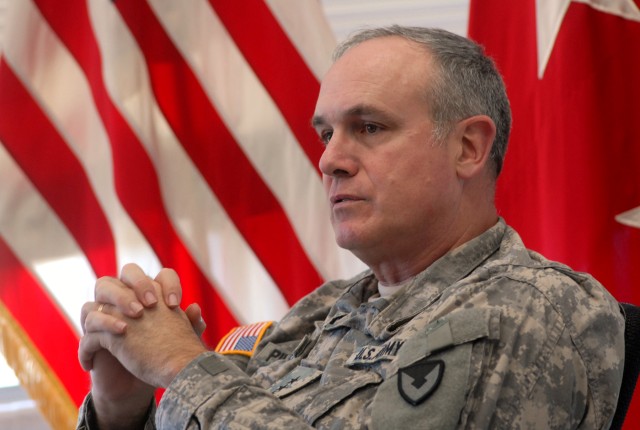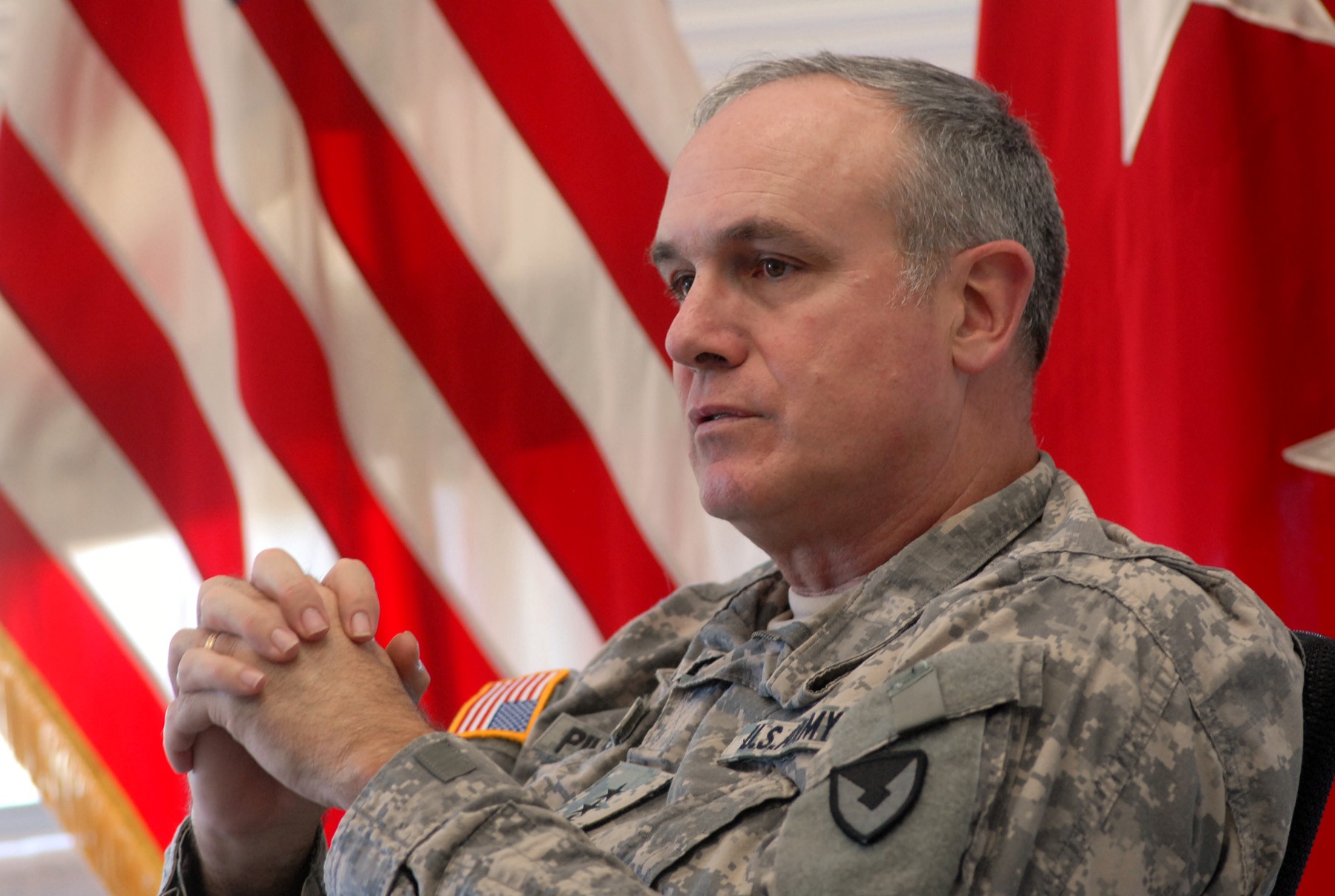
REDSTONE ARSENAL, Ala. -- As he walks out the door following his retirement, the Army Materiel Command's Lt. Gen. Jim Pillsbury will leave behind a 38-year legacy of working in support of Soldiers.
But, for this senior Army aviator, retirement isn't about legacies. It's about beginning a new chapter in his own story of military service with his wife, Becky, at his side.
"There's excitement, sadness, sorrow," Pillsbury said. "Becky and I are excited about the future. And that future is going to be right here in Huntsville."
Pillsbury's retirement is very much a two-person affair. Becky has been as integral to the Army's mission as her husband and she is known in the Huntsville community as being a founder of Still Serving Veterans, a national organization that provides social services support to veterans of all branches. While Pillsbury's Army career will be the focus of a retirement ceremony May 6 at 3 p.m. in Bob Jones Auditorium, the Huntsville community has honored both Pillsbury and his wife.
"At the end of the day, I have tried to serve our Soldiers as best I can," Pillsbury said. "I hope people can look back at Jim and Becky Pillsbury and know we did our best to support the Soldiers."
Pillsbury's current assignment as AMC's deputy commander brought him to Redstone in January. But his relationship with the installation and the local community stretches back much further than that to the days when he served as commander of the Aviation and Missile Command from December 2003 to July 2007.
"Huntsville was a pleasant surprise for us," he said. "After six months, we decided to retire here. We coaxed our children to move here and both are now working on Redstone Arsenal. And we have a grandbaby here, too. I don't know what the future holds for me, but our location is Huntsville."
The lieutenant general is well known at AMCOM for his dry sense of humor and his passion for University of Texas football. He is also well known among community leaders for his work in the early days of the 2005 Base Realignment and Closure recommendations that brought AMC to Redstone. Because of his close association with Redstone, it was only fitting that Pillsbury was the first AMC headquarters general officer to raise his flag at Redstone, with commander Gen. Ann Dunwoody and others following his lead in their moves to Redstone.
"BRAC has brought a shift within the Army Materiel Command," Pillsbury said. "There are four centers of gravity for AMC - Rock Island (Ill.), Warren (Mich.), Fort Monmouth (N.J.) and Redstone Arsenal.
"(Once all the moves are completed), at Redstone you will have the Security Assistance Command, the Army Contracting Command, the Expeditionary Contracting Command and the headquarters for AMC. I think that you will see that, certainly within the Army, Huntsville and Redstone Arsenal will be the center of gravity and will continue to grow in that arena with a work force second to none."
When the 2005 BRAC moves are completed later this year, there will be nearly 70 headquarters and agencies at Redstone.
"The synergy brought together by the wonderful high-tech headquarters and organizations here is unparalleled," Pillsbury said.
Pillsbury commissioned into the Army in 1973, just at the end of the Vietnam War, after attending Trinity University in San Antonio, Texas, on an ROTC scholarship. The anti-military, anti-government sentiment of the time didn't deter his determination to follow in his father's and grandfather's footsteps.
"I grew up with the military. It was really easy for me to make that decision simply because my father was in the Army," he said.
"But the draftee Army was substandard. The challenges were great. As a platoon leader, I led young draftees who were not going to stay in the Army. Many were undisciplined. In some cases, they were uneducated. I knew if I could be successful in the face of those challenges, then I could be even more successful the further I went in the Army."
At first, though, Pillsbury, assigned as a mortar platoon leader and later as a support platoon leader, with the 2nd Battalion, 47th Infantry, 9th Infantry Division at Fort Lewis, Wash., wasn't convinced the Army was his career path.
"I had no clue what was going on. I was the youngest officer at Fort Lewis," he said. "My plan was to pay back the four years of ROTC and get out. But being part of a battalion command team was something that I discovered I really loved. I can't tell you how much I've enjoyed putting on this uniform for 38 years."
Having his wife, Becky, at his side made an Army career much more rewarding.
"She is a tremendous role model. She has been there for me all along," Pillsbury said. "She has been an amazing Army wife, mother and teacher."
Early in his career, Pillsbury served as a platoon leader, detachment commander, and company executive officer and commander. From 1991-93, he served as commander of the 8th Battalion, 101st Aviation Regiment, 101st Airborne Division (Air Assault) at Fort Campbell, Ky.; from 1993-94 he served as executive officer, Force Development, Aviation Division, Office of the Deputy Chief of Staff for Operations and Plans in Washington, D.C.; and from 1995-97 he commanded the Division Support Command, 101st Airborne Division (Air Assault) at Fort Campbell. He also served as assistant division commander (Support) of the 10th Mountain Division (Light), Fort Drum, N.Y., from 1997-98.
His joint assignments include chief of the Sustainability, Mobilization Plans and Exercises Division, J-4, from 1998-99; deputy director for Logistics, Readiness and Requirements, J-4, from 1999-2000; and commander of the Defense Distribution Center, Defense Logistics Agency, New Cumberland, Pa., from 2000-02. From 2002 to October 2003, he was assigned as deputy chief of staff, G-4, for U.S. Army Europe and Seventh Army, Germany. He then was assigned as commander of AMCOM until 2007, when he became AMC's deputy chief of staff for Logistics and Operations, G-3, prior to his current position.
Of his assignments, three really stand out to Pillsbury - his assignment as a support platoon leader for an infantry battalion at Fort Lewis, his assignment as commander of the 101st Aviation Maintenance Battalion at Fort Campbell and his stint as AMCOM's commander.
"Anytime I was in a leadership position, it was a good assignment," Pillsbury said.
"But that first leadership assignment is especially memorable because I had no experience base to draw from. Everything was new to me. We were coming out of Vietnam. It was a drawing down time when our Army was broken and the challenge of leading the young Soldiers of that organization was exasperated by the climate of our country at that time."
Leadership - knowing how to lead Soldiers - is the reason his assignment as the commander of the 101st Aviation Maintenance Battalion is a career highlight.
"When you command a battalion, it is the last time you really get to directly influence Soldiers at the battalion level," he said. "I worked with a great team and it's something I won't ever forget."
And the highlight of his service as commander of AMCOM goes without saying.
"That was the best two-star assignment in the Army," he said. "As the AMCOM commander, you touched all aspects of Army aviation. And we did some wonderful things at that time to improve the institution of the life cycle management concept and condition-based management."
Along the way, Pillsbury has had the benefit of "wonderful role models," such as Vietnam veterans Mike Carden of Huntsville, a retired Army aviation logistician with 28 years of service; retired Lt. Gen. Mike McDuffie, who served three years as the Joint Chiefs of Staff director of logistics; retired Gen. Dick Cody, who served as the 31st vice chief of staff of the Army; Gen. Hugh Shelton, who served as chairman of the Joint Chiefs of Staff from 1997 to 2001; and Gen. Colin Powell, who served as the chairman of the Joint Chiefs of Staff from 1989-93, the national security adviser and the 65th secretary of state.
"They knew how to get the job done and how to take care of Soldiers," Pillsbury said.
"You have to have a passion to be an Army officer or an Army leader. You've got to want to work the long hours and in harsh conditions to serve Soldiers. Obviously, the compensation package is not it. You've got to want to take care of your Soldiers and their families to be successful as an Army leader. The young Soldier is the reason we do what we do. If it's not, then we are wasting a lot of time and resources."
During his career, Pillsbury said the Army transformed itself from the dark days of post-Vietnam to an Army of high values through the development of its educational system, especially for the non-commissioned officer.
"The NCO became the professional core of the Army and by developing our NCOs the Army was turned around," he said. "When the Army made the conscious decision to educate the Soldier and warrant officer, to steep them in leadership skills and to specialize those who needed to be specialized, and when we became an all-volunteer Army, we became the number one most trusted institution in the military."
Yet, Soldiers and their families still pay a difficult price to serve.
"Every day in the military is not wonderful," Pillsbury said. "There are deployments and other times when you are away from your family, when you are sent on a mission that can be dangerous. Soldiers deploy every year or year and a half. It's unbelievable what we're asking these youngsters to do."
Today's environment, in some ways, is tougher than the military environment of the Vietnam era. Even though the U.S. military is drawing down in Iraq, it is still called on in other areas of the world. At a time when Congress wants to make budget cuts in military spending, there are still significant and growing needs for sustainment and modernization.
"It's tough to see what is happening," Pillsbury said. "Military resources are on a down slope. It is frustrating to see that when there are so many needs in the Army."
Even though the Army does face tremendous challenges in transformation and dwindling budgets, Pillsbury believes the Soldier will continue to be the best the nation has to offer.
"The Army ethics of loyalty, duty, respect, honor, integrity, selfless service, personal courage - those things are not just stickers on the wall," he said. "These are the values that Army Soldiers are expected to live. There is tremendous pressure on the Soldier and those that live their lives by the same way in terms of ethics, and there's a powerful, powerful bonding among them."

Social Sharing